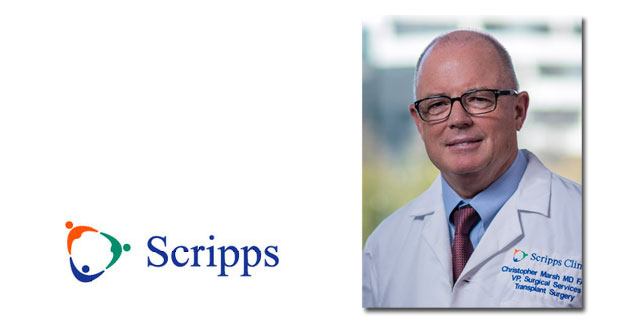North County doctors says goal is to save lives by increasing number of donated organs for transplant
Encinitas CA— In a move designed to increase the number of viable organs available for patients who need life-saving transplants, Scripps Health today has launched a centralized system for retrieving organs from deceased donors.
The new system is the first of its kind in San Diego County. It is being introduced in a phased approach, starting in September with all deceased donors from Scripps Memorial Hospital Encinitas and Scripps Memorial Hospital La Jolla being transported to the new centralized organ recovery center at Scripps Green Hospital in La Jolla. Later this year, Scripps Mercy Hospital’s San Diego and Chula Vista campuses will begin taking part in the new program.
Optimal setting
“The opening of this new center will provide the optimal setting to medically manage the deceased organ collection process, so the maximum number of organs can be collected in the most viable state, and as rapidly as possible for transplantation,” said Christopher Marsh, M.D., division chief of the Scripps Center for Organ Transplantation at Scripps Green Hospital and a Rancho Santa Fe resident. “We believe that having a specialized, dedicated center for organ collection will improve efficiencies in a way that can help save lives.”
The centralized organ recovery program at Scripps Green includes a team of caregivers and resources that are specifically devoted to deceased organ retrieval. This includes critical care doctors, intensive care unit staff and operating room staff, along with designated operating room time for organ collection. A team of Scripps navigators will facilitate the process.
Traditional approach
Traditionally, when the family of a person declared brain dead consents to organ donation, the process of checking and maintaining the health of the eligible donor’s vital organs until transplant surgeons are able to remove them occurs in the donor’s hospital.
This often takes place in the midst of a busy intensive care unit dedicated to picking up care of patients from the emergency department or trauma center. The caregivers may not be able to attend to the deceased donor and family in a timely fashion, as they provide care to the living. The delay or inability to prolong the care to optimize the organ function can result in potentially fewer organs for transplant. Alternately, the ICU may be impacted if the care of the donor requires prolonged management, taking up needed ICU space for new cases coming from the emergency department.
Greater efficiency, consistency
Historically, transplant surgeons have traveled to the donor hospital to collect the organ, performing complex, time-sensitive procedures with unfamiliar personnel, before hurrying back to transplant into the recipient. The new centralized system is designed to bring more efficiency and consistency to the process.
Scripps Green is particularly well-suited to house the new program. It is already home to Scripps’ long-established organ transplant program and is the only medical acute-care hospital in the county that does not have an emergency department on site. That means the demand for operating room time is more predictable and there’s no chance that an emergency case will delay the organ recovery team.
Research has shown this centralized, dedicated approach used in other U.S. cities has the potential to save more lives. In a study published in the Journal of the American College of Surgeons in 2016, transplant surgeons reported a higher number of transplantable organs recovered when brain-dead donors are moved from their hospital of origin to a dedicated organ recovery facility.
Tremendous need
There is tremendous need for more donated organs in the United States. More than 100,000 people in the U.S. are currently on the waiting list for a life-saving organ transplant, according to the United Network of Organ Sharing. On average, 20 people die each day waiting for an organ transplant.
As a show of respect and appreciation, Scripps Green Hospital will arrange an honor walk for each deceased donor, with hospital staff lining the hallways as the donor is transported to the operating room for organ recovery.
ABOUT SCRIPPS HEALTH
Founded in 1924 by philanthropist Ellen Browning Scripps, Scripps Health is a nonprofit integrated health care delivery system based in San Diego, Calif. Scripps treats more than 600,000 patients annually through the dedication of 3,000 affiliated physicians and more than 15,000 employees among its five acute-care hospital campuses, home health care services, 28 outpatient centers and clinics, and hundreds of affiliated physician offices throughout the region.
Recognized as a leader in disease and injury prevention, diagnosis and treatment, Scripps is also at the forefront of clinical research. With three highly respected graduate medical education programs, Scripps is a longstanding member of the Association of American Medical Colleges. Scripps has been ranked five times as one of the nation’s best health care systems by Truven Health Analytics. Its hospitals are ranked No. 1 in San Diego County and among the best in the nation by U.S. News & World Report. Scripps also is recognized by Advisory Board, Fortune and Working Mother magazine as one of the best places in the nation to work. More information can be found at www.scripps.org.



